|
|
|
Sort Order |
|
|
|
Items / Page
|
|
|
|
|
|
|
| Srl | Item |
| 1 |
ID:
172487


|
|
|
|
|
| Summary/Abstract |
Even though the Kim regime has been an exception, the pattern of rapid, unexpected regime collapse among hereditary autocracies indicates a need for policymakers to be prepared.
|
|
|
|
|
|
|
|
|
|
|
|
|
|
|
|
| 2 |
ID:
156539
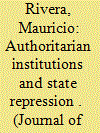

|
|
|
|
|
| Summary/Abstract |
Existing research has paid increasing attention to the role of political institutions such as legislatures and opposition parties in autocracies. So far, however, the relationship between nondemocratic institutions and state repression has remained largely unclear. This article argues that authoritarian institutions are related to divergent conflicting dynamics between incumbent regimes and opposition actors, which provide leaders with opposite incentives to repress. While authoritarian legislatures enhance leaders’ capacity to prevent conflict and reduce their need for repression, the presence of opposition parties helps opposition actors to overcome collective action barriers and mobilize against the incumbent regime, increasing the states’ need for repression. A panel data analysis of nondemocracies from 1976 to 2007 shows that authoritarian-elected legislatures reduce repression and the presence of opposition parties increases it. Moreover, the results indicate that autocracies with opposition parties and an elected legislature experience lower repression than autocracies with opposition parties but no elected legislature.
|
|
|
|
|
|
|
|
|
|
|
|
|
|
|
|
| 3 |
ID:
165095
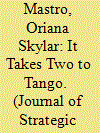

|
|
|
|
|
| Summary/Abstract |
What factors do autocracies evaluate when responding to perceived threats and why might they fail to balance appropriately? I posit that autocratic leaders may choose greater exposure to an external threat if, by doing so, it preserves regime legitimacy. Specifically, the desire to promote a positive image to one’s domestic public creates incentives to publicly downplay a rival’s military progress, which then affects the state’s ability to mobilize resources to respond to the growing threat. I test this theory in the case of China’s response to India’s military rise. This research contributes to balancing theory and empirical work on East Asian security.
|
|
|
|
|
|
|
|
|
|
|
|
|
|
|
|
| 4 |
ID:
138306


|
|
|
|
|
| Summary/Abstract |
How and why do regime type and interstate war affect government spending? We argue that a political leader allocates scarce resources between social and military expenditures as a function of their relative efficiency in securing her political survival. We derive four hypotheses concerning how mobilization for and demobilization from interstate war affects government spending differently in democratic and autocratic regimes. Compared to democracies, autocracies should increase military spending to a greater degree during wartime and decrease military spending to a greater extent following a war. Autocracies also should cut social spending more during an interstate war and increase social spending more during the process of demobilization from war than democracies. Our analyses of all states in the international system from 1950 to 2001 yield support for our hypotheses.
|
|
|
|
|
|
|
|
|
|
|
|
|
|
|
|
| 5 |
ID:
128214
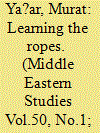

|
|
|
|
|
| Publication |
2014.
|
| Summary/Abstract |
This article analyses the topoi of the Young Turk reading of the 1905 Russian Revolution. It argues that the Young Turks considered the 1905 Revolution as a victory against autocratic regimes and as an edificatory example for the Ottoman constitutionalists. This example provided the Young Turks with a mirror in which they saw a model of revolution from below. As such, in addition to encouraging the Young Turks to formulate and re-assess their methods and means of establishing a constitutional regime in the Ottoman Empire, the 1905 Revolution helped them to transform their initially intellectual movement to an effectual political one.
|
|
|
|
|
|
|
|
|
|
|
|
|
|
|
|
| 6 |
ID:
124986
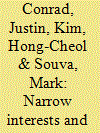

|
|
|
|
|
| Publication |
2013.
|
| Summary/Abstract |
Narrow interests and military resource allocation in autocratic regimes
Why do some autocratic states allocate more resources to the military than others? We contend that as narrow political interests have more influence on a leader, relative to broader political interests, a state's military burden increases. Further, we argue that two domestic factors are central to explaining the relative strength of narrow political interests for military spending, and therefore variation in state military burden. First, institutions that increase the cost of political participation reduce the influence of the median citizen, increasing the strength of narrow political interests and, concomitantly, military spending. Second, as a regime ages, narrow interests become more entrenched and the regime becomes less concerned about overthrow. In turn, older regimes spend more on their militaries. We test hypotheses from this argument by examining the military burden for all autocracies over the period 1950-2000. We find that variation in restrictions on political participation and the age of the regime are central to understanding differences in military spending among autocracies. Further, once these institutional features are taken into account, we find only modest support for the view that certain types of regimes spend more than others. What matters is not regime type but specific institutional features that affect the strength of narrow interests and vary across, and within, autocratic regimes.
|
|
|
|
|
|
|
|
|
|
|
|
|
|
|
|
| 7 |
ID:
121623
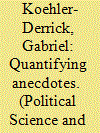

|
|
|
|
|
| Publication |
2013.
|
| Summary/Abstract |
The events of 2011 transformed the politics of the Arab world. In just under 12 months, dictators fell in three countries: Tunisia, Egypt, and Libya. In Bahrain, Yemen, and Syria, protests and violence continued throughout 2012 to shake what were once assumed to be the solid foundations of long-standing autocratic regimes. Although it is too soon to assess the outcome of these events, one immediate consequence is clear: the empowerment of public opinion in Arab politics. For the first time in more than 50 years, the voices of average Tunisians, Egyptians, and Libyans can directly influence political outcomes. This shift may yet prove to be temporary, but its importance in driving current events cannot be discounted.
|
|
|
|
|
|
|
|
|
|
|
|
|
|
|
|
| 8 |
ID:
143145
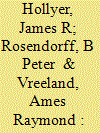

|
|
|
|
|
| Summary/Abstract |
The collapse of autocratic regimes is often brought about through large-scale mobilization and collective action by elements of the populace. The willingness of any given member of the public to participate in actions such as strikes and protests is contingent upon her beliefs about others’ willingness to similarly mobilize. In this article, we examine the effect of a specific form of transparency—the disclosure of economic data by the government—on citizen belief formation, and consequently on collective mobilization. We present a theoretical model in which, under autocratic rule, transparency increases the frequency of protests, and increases the extent to which protest is correlated with incumbent performance. We find empirical support for these claims. Transparency destabilizes autocracies via mass protest.
|
|
|
|
|
|
|
|
|
|
|
|
|
|
|
|
|
|
|
|
|